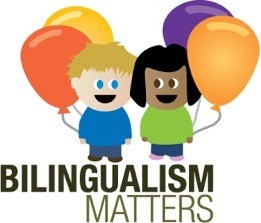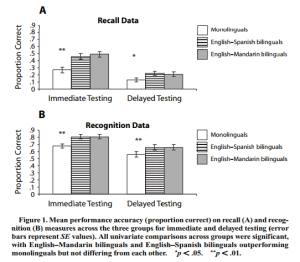Word learning is a good way to index language ability in bilinguals because these tasks show a child’s general ability to process linguistic information but do not rely on existing linguistic knowledge (Peña et al., 2001). This means that people who are bilingual should perform just as well on word-learning tasks as monolinguals and better than bilinguals who experience language deficits even though they have poor language knowledge due to low proficiency. However, there are very little known facts about how bilingual people learn words. Recent studies have been conducted to compare bilingual and monolingual adults on their ability to learn new words. Findings that were found were that people who are bilingual that were tested in their native language outperformed monolingual adults on word-learning tasks.
An example of this is the Kaushanskaya and Marian (2009) which examined the effects of cross-linguistic inconsistencies between bilingual and monolingual adults and found that native-language orthographic information that was presented during learning interfered with encoding of novel words in monolinguals, but not in bilinguals. This shows that bilinguals may be shielded from native-language interference during novel word-learning. 24 English-Spanish bilinguals and 24 English-speaking monolinguals from Northwestern University students that were comparable in age and education levels were used as participants in this study. Both these bilingual and monolingual participants underwent vocabulary learning and testing. The results were as follows. English-Spanish bilinguals revealed higher accuracy rates than in monolinguals. Bilinguals outperformed monolinguals on all performance measures pertaining to words learned bimodally. For words that were learned unimodally, bilinguals also outperformed monolinguals during immediate testing but not during delayed testing. An additional information that they found were that bilingual participants were more accurate than monolingual participants at recognizing visually presented novel words which indicated that bilingual participants were paying attention to the visual forms of the novel words during the hearing-and-seeing learning phase.
To continue this further, Kaushanskaya and Marian (2009) did another study on whether bilingualism facilitates examined word-learning performance in adults. This study involved 20 English-Mandarin bilinguals, 20 English-Spanish bilinguals, and 20 monolingual speakers all comparable in their age, education and English as their native language. All 3 groups also underwent vocabulary learning and testing and found that English-Spanish bilinguals and English-Mandarin bilinguals demonstrated more accuracy rates than monolinguals. The analysis and figure below also reveals that participants perform more accurately during immediate testing than during delayed testing. Both bilingual groups outperformed the monolingual group on both immediate and delayed tests. This shows that bilingual children can acquire new words efficiently under and learning conditions and may be less contingent on latent vocabulary knowledge than in monolingual children.
Furthermore, another study to prove that bilingual speakers outperform monolingual speakers was the Kaushanskaya, Blumenfeld, and Marian (2011). Their objective was to find out the performance of bilingual speakers on standardized tests of vocabulary knowledge in English (their native language) and the relationship between phonological short-term memory and vocabulary knowledge in monolingual and bilingual speakers. The results for experiment 1 were that there was similar performance on the PPVT-III (Peabody Picture Vocabulary Test-III) test as well as performance on digit-span between monolinguals and bilinguals. These comparisons indicate that bilingualism did not reduce the level of dominant-language vocabulary and short-term memory performance found in monolinguals. However, another result that Kaushanskaya, Blumenfeld, and Marian (2011) found was that monolingual English speakers digit-span scores did not correlate with the PPVT-III but bilingual English-Spanish speakers correlated strongly and positively.

